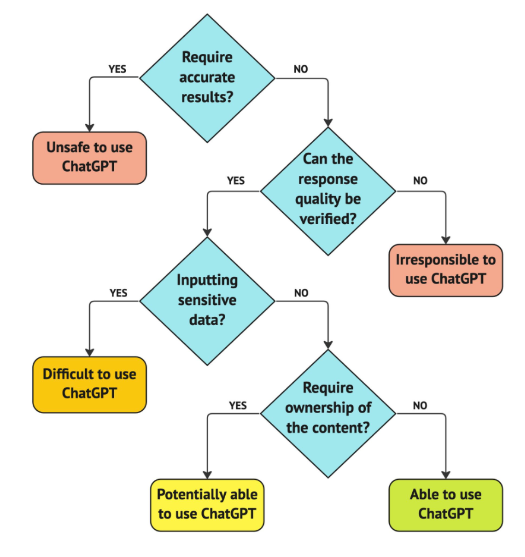Adopting ChatGPT
Augmenting Workflows
Workflows are developed through experience and innovation to achieve high-quality results efficiently. Many repetitive tasks in these workflows can now be handled by ChatGPT, improving both quality and timeliness.

A Standard Workflow
For example, when summarizing a complex 30-page project document, the traditional workflow involves manually extracting key findings and proofreading. This process is time-consuming and labor-intensive.
With ChatGPT, we can automate parts of this process. By asking ChatGPT to summarize the document, we only need to proofread the summary, saving time and allowing focus on more creative tasks.
Who Can Use ChatGPT?
ChatGPT benefits various roles and industries by integrating into their workflows, each with different needs and outputs. While considerations of ownership and privacy are important, many roles can see significant advantages.
Leaders
- Compose emails
- Draft presentations
- Brainstorm strategic ideas
- Summarize meeting notes
- Verification is advisable for complex content
Technical Roles
- Recall code syntax
- Generate code examples
- Explain and troubleshoot code
- Write accompanying documentation
HR and People Teams
- Brainstorm initiatives for employee engagement and well-being
- Communicate effectively with employees
Marketing
- Write social media posts
- Copyedit content
- Create marketing copy
- Optimize content for search engines with target keywords
Sales
- Generate outreach templates
- Personalize outreach content
- Brainstorm approaches and strategies
- Summarize information from internal stakeholders
Validating a Use Case
When considering ChatGPT for a specific use case, several factors must be evaluated to ensure its suitability.
- Determine if a high degree of accuracy is needed.
- ChatGPT can be inaccurate and unpredictable.
- ChatGPT can provide different responses to the same prompt.
- If certainty is required, ChatGPT is not suitable.
- Not suitable for government policy advisory,
Diagram:

Verification Ability
- Assess if the response quality can be verified.
- Subject matter expertise is crucial for evaluating ChatGPT's outputs.
- Avoid using ChatGPT for tasks you couldn't verify yourself.
Sensitivity of Data
- Check if sensitive data is involved (personal info, source code).
- Requires consent and compliance with GDPR, CCPA.
- Seek legal counsel for sensitive data use cases.
Ownership Requirements
- Assess if ownership is needed, especially for revenue generation.
- Users can claim ownership if compliant with OpenAI's terms, but copyright issues may arise.
- Proceed with testing if ownership is not required.